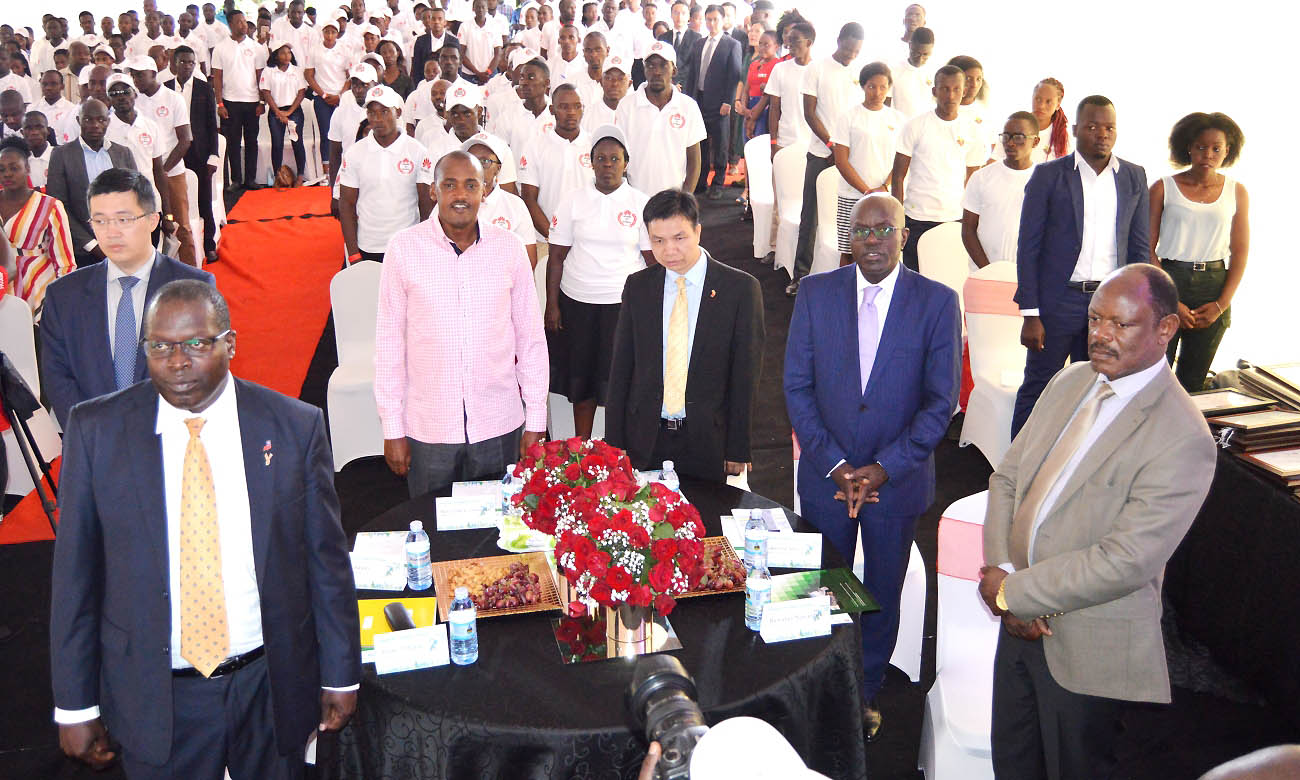The Minister of Information and Communications Technology (ICT) and National Guidance, Hon. Frank K. Tumwebaze has called for equipping of students with hands-on skills to enable them fit into this fast growing economy. He was speaking at the Makerere University Guest House gardens on Tuesday, 14th May 2019 where hundreds of students and members of the public gathered to witness the launch of Huawei ICT Academy at Makerere University. The function also doubled as the flag off ceremony for ten students flying to China for three weeks’ training at HUAWEI under Seeds for the Future Program.
The Guest of Honor, Hon. Frank Tumwebaze advised all universities to train students on becoming job creators and not job seekers by equipping them with practical skills before they graduate. This he said would enable students to commercialize their skills and earn from them after campus.
“It has come to our notice that most students study for the purpose of graduating and leaving Universities but lack practical skills. This is why the Ministry of Education and Sports (MoES) is now focusing on universities equipping students with skills and not theories alone,” advised Hon. Tumwebaze.

Giving an example of Mr. Ren Zhengfei the founder of Huawei, Hon Tumwebaze stressed the audience to commercialize their skills so as to benefit from them.
“The Huawei founder realized his skill and worked on it and today his company is earning him billions of money. That’s what young Ugandans should do. When you realize that you have a skill, do not sit back; work hard to improve on it and it will earn you more than you expect,” Hon. Tumwebaze said.
The Minister thanked Huawei for picking interest in skilling young Ugandans through the ICT Academy at Makerere University and requested the company to extend the same services to rural areas so that all Ugandans can get an opportunity to acquire valuable skills.

On behalf of the Ambassador, the Deputy Chief of Mission of the Chinese Embassy in Uganda Mr. Chen Huixin, revealed that Huawei has been carrying out its businesses in Uganda since 2001. He added that Huawei joined the Buy Uganda Build Uganda (BUBU) campaign in order to promote Uganda’s products and that the Seeds for the Future Program will produce good yields for Uganda.
He emphasized teamwork among members if any progress is to be made, noting that Huawei has reached its current level because of teamwork.
“If you want to travel fast travel alone, if you want to travel far travel together. This means that together we can go beyond and do more and that’s what Huawei is doing in Uganda,” said Mr. Huixin.
The Deputy Chief of Mission challenged the audience to end digital illiteracy by educating others about ICT because it is one of four pillars one looks for in prospective employees. “With technology skills, Uganda will develop at a very fast pace, which will enable the country to join other middle economy countries.”

Addressing the audience, the Vice Chancellor Prof. Barnabas Nawangwe shared that Makerere University has signed more than 10 Memorandums of Understanding (MoUs) with China’s leading Universities such as Tsinghua University.
He thanked Huawei for fulfilling its promise to set up the ICT Academy at East Africa’s premier University and emphasised that Makerere is fully committed to working with Government to take the country to middle income status.
Prof. Nawangwe called upon the students as primary beneficiaries to take advantage of the Academy because they are the hope for the future. “Makerere University values the support given to its students by Huawei and given the chance; we are willing to take on even more opportunities.”

The Permanent Secretary Ministry of Education and Sports (MoES), Mr. Alex Kakooza applauded Makerere University for starting up the Confucius Institute which has opened new doors for Ugandans to learn Chinese.
He revealed that the Ministry is ready to work with Seeds for the Future in Makerere and other Universities and called upon students to participate in the in the Huawei ICT Academy activities.
“You will never reach your full potential unless you learn how to serve others,” the Principal College of Computing and Information Sciences (CoCIS) Prof. Tonny Oyana advised. This he said to the 10 successful Seeds for the Future students who were being flagged off to China for their trip.

Prof. Oyana informed the audience that the Huawei ICT Academy was initiated in September 2018 with the aim of training and equipping 1,000 Ugandan students in two years. He added that Huawei donated equipment worth 30,000USD and will make a 15,000USD annual cash donation to the gazetted resource Centre to be hosted at CoCIS. The Academy which will be free of charge will also offer certification.
“The aim of the Huawei ICT Academy is to partner with Universities to encourage students to gain skills in the practical field of technology over the next two years,” said the Managing Director Huawei Uganda Mr. Liu Jiawei.

The best students were awarded as follows
1st place:
- Mr. Katerega Daniel from Makerere University received a Huawei MateBook X, Y7 Smartphone and a trophy.
2nd Place:
- Mr. Muwonge Julius from Makerere University and Mr. Musisi Charles from Kyambogo University each received a Huawei Y7 Smartphone, trophy and a certificate.
3rd Place:
- Mr. Kiwanuka Brain
- Miss Nabuufu Ereth
- Mr. Rutembana Abais
Excellent students awarded certificates and Y7 Smartphones
- Mr. Kizza Ivan Nobert
- Mr. Ogwang Benjamin
- Miss Moureen Caroline
- Mr. Mugisha Ali
- Mr. Baale Ali
Article by Rachael Kanyi, Volunteer, Mak Public Relations Office

 General11 hours ago
General11 hours ago
 General10 hours ago
General10 hours ago
 Humanities & Social Sciences1 week ago
Humanities & Social Sciences1 week ago
 General1 week ago
General1 week ago
 Agriculture & Environment2 weeks ago
Agriculture & Environment2 weeks ago









